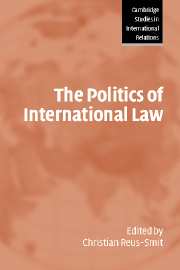Book contents
- Frontmatter
- Contents
- List of contributors
- Preface
- 1 Introduction
- 2 The politics of international law
- 3 When states use armed force
- 4 Soft law, hard politics, and the Climate Change Treaty
- 5 Emerging customary norms and anti-personnel landmines
- 6 International law, politics, and migrant rights
- 7 The International Criminal Court
- 8 The Kosovo bombing campaign
- 9 International financial institutions
- 10 Law, politics, and international governance
- 11 Society, power, and ethics
- Bibliography
- Index
- CAMBRIDGE STUDIES IN INTERNATIONAL RELATIONS
5 - Emerging customary norms and anti-personnel landmines
Published online by Cambridge University Press: 22 September 2009
- Frontmatter
- Contents
- List of contributors
- Preface
- 1 Introduction
- 2 The politics of international law
- 3 When states use armed force
- 4 Soft law, hard politics, and the Climate Change Treaty
- 5 Emerging customary norms and anti-personnel landmines
- 6 International law, politics, and migrant rights
- 7 The International Criminal Court
- 8 The Kosovo bombing campaign
- 9 International financial institutions
- 10 Law, politics, and international governance
- 11 Society, power, and ethics
- Bibliography
- Index
- CAMBRIDGE STUDIES IN INTERNATIONAL RELATIONS
Summary
A new international legal norm rapidly emerged in the 1990s prohibiting the use, transfer, production, and stockpiling of anti-personnel (AP) landmines. Marked as it has been by broad participation and extremely rapid entry into force, this norm has attained impressive status compared to the lengthy process taken by many international legal norms – especially those governing warfare – to spread and consolidate. Yet, participation in the legal regime is not universal, raising the question of whether or not the norm has broad enough adherence to qualify as a customary rule of international law. A ruling of such status by a court – say in a civil case by a victim seeking damages from AP landmine use, analogous to recent rulings on cases of torture – would mark a critical benchmark in the consolidation and application of the norm. Such a determination would mean that the AP landmine norm is held to generate legal obligations even for non-state actors and those states that have not signalled their explicit consent to the treaty.
In this chapter I undertake two main tasks. First, I examine whether the AP landmine norm would qualify as a rule of customary law, and in doing so I contribute to this volume's critique of realist and neoliberal accounts of international law. I examine the customary status of the AP landmine taboo by illuminating the shortcomings of consent-based approaches to international legal and political theory, and show how incorporating insights from constructivist international relations scholarship can enrich our understanding of the emergence of customary legal norms.
- Type
- Chapter
- Information
- The Politics of International Law , pp. 106 - 130Publisher: Cambridge University PressPrint publication year: 2004
- 17
- Cited by



